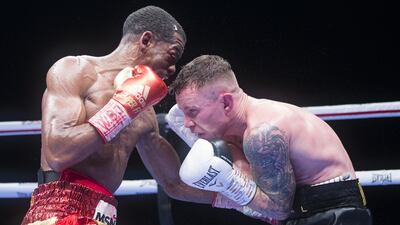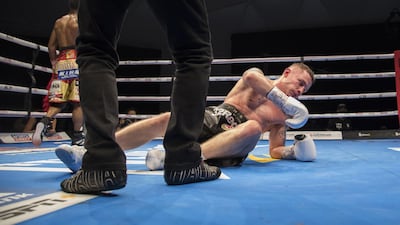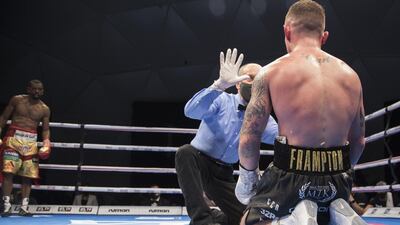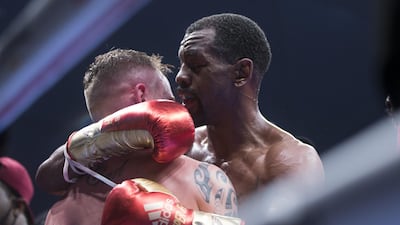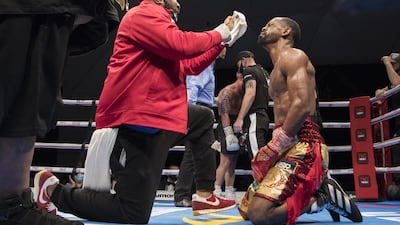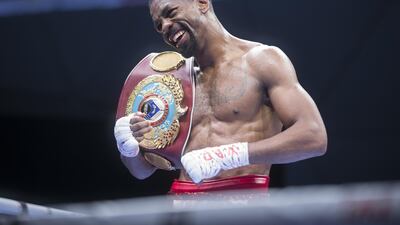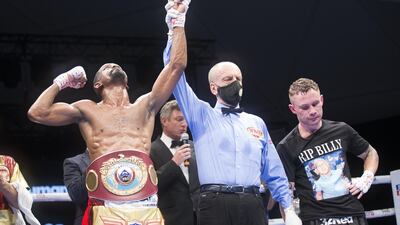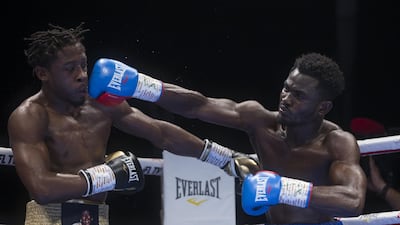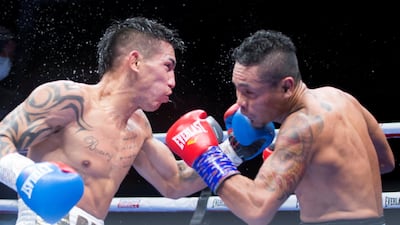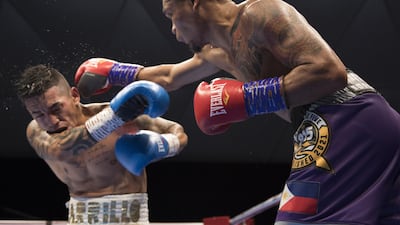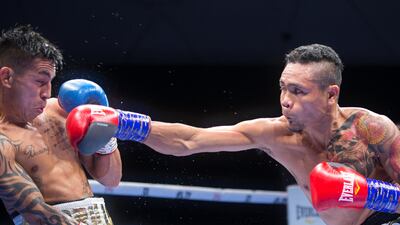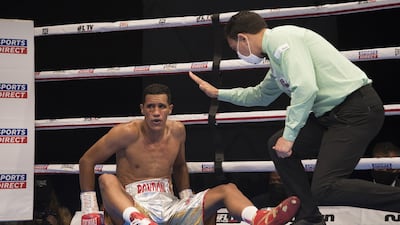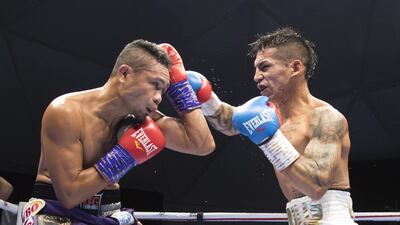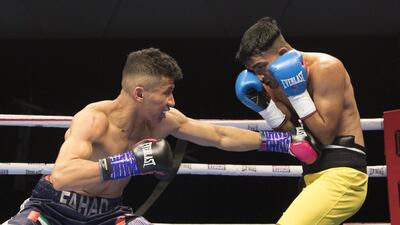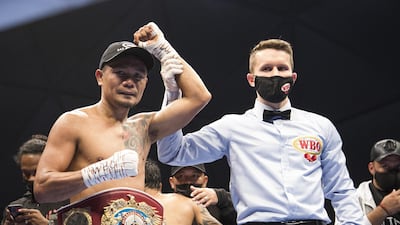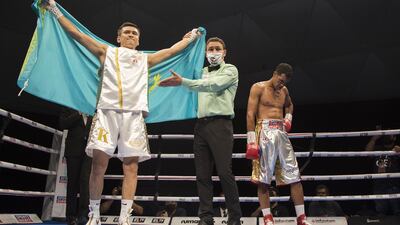D4G Promotions, the company who brought Saturday’s high-profile “Legacy” boxing event to Dubai, is targeting at least another two world-title fights for the emirate this year.
The weekend's event, staged at Caesars Palace Bluewaters, was billed as the biggest night of boxing to be held in the UAE, with Jamel Herring's WBO super-featherweight clash against Carl Frampton the headline. Herring stopped the former two-division world champion in the sixth round to retain his belt.
The night, held in front of a limited crowd because of Covid-19 protocols, also featured wins for fast-rising American Keyshawn Davis and Filipino four-weight world champion Donnie Nietes, while Emirati Fahad Al Bloushi and Dubai-based Indian Faizan Anwar also fought on the undercard. The event was broadcast on ESPN+ in the United States and Channel 5 in the UK and Ireland.
D4G Promotions promoter Ahmed A Seddiqi, who has been involved in boxing in the UAE for almost a decade, said his company is seeking to put on another world title fight this summer and then one at the end of the year, with possibility another to come, too.
"The plan is to keep on going on, because now we've started we can never stop," Seddiqi told The National. "Because if we stop then the sport or whatever we've worked on in the past decade is going to go to waste. So we have to keep moving forward, bring on more world title fights.
“We plan to bring at least three to Dubai this year itself [including Saturday’s event]. Of course, I’m not talking ‘super fights’, Canelo [Alvarez] or Tyson Fury, because that’s a very high cost. But eventually we will reach there, once we see the momentum, once the government sees the impact boxing has on the city, then we hope the support comes from the higher government levels to bring such events.
“But for us, in terms of continuity and keeping up the momentum, we’re not stopping. Nothing is going to keep us from that. We’ll keep getting similar-level fights or even better, and go on to build a proper fan base in the country. That’s the target. Because at the moment people are still not used to boxing, they’re just used to the high, high-level fights. But here we want to grow it from the grassroots."
________________________________________________
Frampton loses to Herring in Dubai
________________________________________________
Keen also to promote both local and locally based boxers, D4G Promotions have organised a number of events since their first live televised professional fight at Emirates Golf Club in April 2019. Since then, they have organised a fight night in Kazakhstan and four “Rotunda Rumble” events, which also were staged at Caesars Palace. The most recent was last October.
Seddiqi said he was “very close” to "Legacy" taking place at the Coca-Cola Arena, and that the desire exists to stage shows there later this year, public health guidelines permitting.
“Depending on the regulations, we are ready to have it in the big arenas,” he said. “And we’re very confident that it doesn’t need to be a ‘super fight’ for us to fill an arena. The proper exposure, the proper support from government entities, will make that happen. And I believe if we get a, for example, Nietes fighting at the Coca-Cola Arena, we could easily fill it, with the proper price point.
“He’s a Filipino legend and appeals to a huge community here. As you saw on the card, since Day 1 I’ve always liked to have multinational fighters to cater to as many nationalities as we can. Dubai has more than 200 nationalities. It would be a big deal to have him fight here for a world title and continue his legacy – not only for the Filipino community.
“And then we have to sit with promoters to discuss what other fights make sense here. Because those world-title fights that we’re planning, we want to bring fighters that attract people to come watch them from abroad. The focus is to bring fighters to attract their fan base to travel and come to Dubai to see this marvellous city. We need to give back to our city as well.”
Nietes is a Filipino legend and appeals to a huge community here
Seddiqi said he “wouldn’t be surprised” if Saudi Arabia seals a deal to host this summer's much-anticipated world heavyweight unification bout between Anthony Joshua and Fury, saying he would welcome the impact of such an event on boxing in the region overall.
Seddiqi said he believes the greatest obstacle for such bouts taking place in Dubai, or the UAE, has always typically come down to the substantial financials involved.
“When it comes to ‘super fights’ it’s the big site fees that need to be paid,” he said. “We’ve already spoken in the past about some big fights that I don’t want to mention, and we had very close negotiations, but because of these restrictions things fell off. We want it to happen, just not as a big-money event but as a successful business plan. It’s difficult to recover money from the ‘super fights’ but anything that comes back to the city of country is a plus. Because the exposure that ‘super fights’ can bring to the city is still not appreciated right now.
“But we’re not focusing on those ‘super fights’; if they come, we’re more than happy to see them in the country, no matter if it’s Dubai, Abu Dhabi, Sharjah, wherever – at the end of the day it’s one country.
“Our focus, if you want to ask me, is to build a proper ecosystem. We want fans to come to smaller events as well, to enjoy them. We’ve been working on this for years and more people are getting into it, so that means we’re going in the positive direction.
“Boxing is everything to me and to see just one event and then full stop, that doesn’t make sense. That means I’m not doing my job correctly. So for us, yes ‘super fights’ are important – having Joshua-[Andy] Ruiz 2 in Saudi [in December 2019] was good for us too, because people know that something is happening in the region. The country doesn’t matter because we’re all one.
"If it works there, it supports here. If it supports here, it’s going to attract boxers from that country to come. As I said, it’s a proper ecosystem we’re working on.”
SHOW COURTS ORDER OF PLAY
Centre Court (4pm UAE/12pm GMT)
Victoria Azarenka (BLR) v Heather Watson (GBR)
Rafael Nadal (ESP x4) v Karen Khachanov (RUS x30)
Andy Murray (GBR x1) v Fabio Fognini (ITA x28)
Court 1 (4pm UAE)
Steve Johnson (USA x26) v Marin Cilic (CRO x7)
Johanna Konta (GBR x6) v Maria Sakkari (GRE)
Naomi Osaka (JPN) v Venus Williams (USA x10)
Court 2 (2.30pm UAE)
Aljaz Bedene (GBR) v Gilles Muller (LUX x16)
Peng Shuai (CHN) v Simona Halep (ROM x2)
Jelena Ostapenko (LAT x13) v Camila Giorgi (ITA)
Jo-Wilfried Tsonga (FRA x12) v Sam Querrey (USA x24)
Court 3 (2.30pm UAE)
Kei Nishikori (JPN x9) v Roberto Bautista Agut (ESP x18)
Carina Witthoeft (GER) v Elina Svitolina (UKR x4)
Court 12 (2.30pm UAE)
Dominika Cibulkova (SVK x8) v Ana Konjuh (CRO x27)
Kevin Anderson (RSA) v Ruben Bemelmans (BEL)
Court 18 (2.30pm UAE)
Caroline Garcia (FRA x21) v Madison Brengle (USA)
Benoit Paire (FRA) v Jerzy Janowicz (POL)
3%20Body%20Problem
%3Cp%3E%3Cstrong%3ECreators%3A%3C%2Fstrong%3E%20David%20Benioff%2C%20D%20B%20Weiss%2C%20Alexander%20Woo%3C%2Fp%3E%0A%3Cp%3E%3Cstrong%3EStarring%3A%20%3C%2Fstrong%3EBenedict%20Wong%2C%20Jess%20Hong%2C%20Jovan%20Adepo%2C%20Eiza%20Gonzalez%2C%20John%20Bradley%2C%20Alex%20Sharp%3C%2Fp%3E%0A%3Cp%3E%3Cstrong%3ERating%3A%3C%2Fstrong%3E%203%2F5%3C%2Fp%3E%0A
Breaking News: The Remaking of Journalism and Why It Matters Now
Alan Rushbridger, Canongate
'The Coddling of the American Mind: How Good Intentions and Bad Ideas are Setting up a Generation for Failure'
Greg Lukianoff and Jonathan Haidt, Penguin Randomhouse
Five famous companies founded by teens
There are numerous success stories of teen businesses that were created in college dorm rooms and other modest circumstances. Below are some of the most recognisable names in the industry:
- Facebook: Mark Zuckerberg and his friends started Facebook when he was a 19-year-old Harvard undergraduate.
- Dell: When Michael Dell was an undergraduate student at Texas University in 1984, he started upgrading computers for profit. He starting working full-time on his business when he was 19. Eventually, his company became the Dell Computer Corporation and then Dell Inc.
- Subway: Fred DeLuca opened the first Subway restaurant when he was 17. In 1965, Mr DeLuca needed extra money for college, so he decided to open his own business. Peter Buck, a family friend, lent him $1,000 and together, they opened Pete’s Super Submarines. A few years later, the company was rebranded and called Subway.
- Mashable: In 2005, Pete Cashmore created Mashable in Scotland when he was a teenager. The site was then a technology blog. Over the next few decades, Mr Cashmore has turned Mashable into a global media company.
- Oculus VR: Palmer Luckey founded Oculus VR in June 2012, when he was 19. In August that year, Oculus launched its Kickstarter campaign and raised more than $1 million in three days. Facebook bought Oculus for $2 billion two years later.
Another way to earn air miles
In addition to the Emirates and Etihad programmes, there is the Air Miles Middle East card, which offers members the ability to choose any airline, has no black-out dates and no restrictions on seat availability. Air Miles is linked up to HSBC credit cards and can also be earned through retail partners such as Spinneys, Sharaf DG and The Toy Store.
An Emirates Dubai-London round-trip ticket costs 180,000 miles on the Air Miles website. But customers earn these ‘miles’ at a much faster rate than airline miles. Adidas offers two air miles per Dh1 spent. Air Miles has partnerships with websites as well, so booking.com and agoda.com offer three miles per Dh1 spent.
“If you use your HSBC credit card when shopping at our partners, you are able to earn Air Miles twice which will mean you can get that flight reward faster and for less spend,” says Paul Lacey, the managing director for Europe, Middle East and India for Aimia, which owns and operates Air Miles Middle East.
Top tips
Create and maintain a strong bond between yourself and your child, through sensitivity, responsiveness, touch, talk and play. “The bond you have with your kids is the blueprint for the relationships they will have later on in life,” says Dr Sarah Rasmi, a psychologist.
Set a good example. Practise what you preach, so if you want to raise kind children, they need to see you being kind and hear you explaining to them what kindness is. So, “narrate your behaviour”.
Praise the positive rather than focusing on the negative. Catch them when they’re being good and acknowledge it.
Show empathy towards your child’s needs as well as your own. Take care of yourself so that you can be calm, loving and respectful, rather than angry and frustrated.
Be open to communication, goal-setting and problem-solving, says Dr Thoraiya Kanafani. “It is important to recognise that there is a fine line between positive parenting and becoming parents who overanalyse their children and provide more emotional context than what is in the child’s emotional development to understand.”
Why it pays to compare
A comparison of sending Dh20,000 from the UAE using two different routes at the same time - the first direct from a UAE bank to a bank in Germany, and the second from the same UAE bank via an online platform to Germany - found key differences in cost and speed. The transfers were both initiated on January 30.
Route 1: bank transfer
The UAE bank charged Dh152.25 for the Dh20,000 transfer. On top of that, their exchange rate margin added a difference of around Dh415, compared with the mid-market rate.
Total cost: Dh567.25 - around 2.9 per cent of the total amount
Total received: €4,670.30
Route 2: online platform
The UAE bank’s charge for sending Dh20,000 to a UK dirham-denominated account was Dh2.10. The exchange rate margin cost was Dh60, plus a Dh12 fee.
Total cost: Dh74.10, around 0.4 per cent of the transaction
Total received: €4,756
The UAE bank transfer was far quicker – around two to three working days, while the online platform took around four to five days, but was considerably cheaper. In the online platform transfer, the funds were also exposed to currency risk during the period it took for them to arrive.
The Prison Letters of Nelson Mandela
Edited by Sahm Venter
Published by Liveright
Key findings of Jenkins report
- Founder of the Muslim Brotherhood, Hassan al Banna, "accepted the political utility of violence"
- Views of key Muslim Brotherhood ideologue, Sayyid Qutb, have “consistently been understood” as permitting “the use of extreme violence in the pursuit of the perfect Islamic society” and “never been institutionally disowned” by the movement.
- Muslim Brotherhood at all levels has repeatedly defended Hamas attacks against Israel, including the use of suicide bombers and the killing of civilians.
- Laying out the report in the House of Commons, David Cameron told MPs: "The main findings of the review support the conclusion that membership of, association with, or influence by the Muslim Brotherhood should be considered as a possible indicator of extremism."
Founders: Abdulmajeed Alsukhan, Turki Bin Zarah and Abdulmohsen Albabtain.
Based: Riyadh
Offices: UAE, Vietnam and Germany
Founded: September, 2020
Number of employees: 70
Sector: FinTech, online payment solutions
Funding to date: $116m in two funding rounds
Investors: Checkout.com, Impact46, Vision Ventures, Wealth Well, Seedra, Khwarizmi, Hala Ventures, Nama Ventures and family offices
Terror attacks in Paris, November 13, 2015
- At 9.16pm, three suicide attackers killed one person outside the Atade de France during a foootball match between France and Germany
- At 9.25pm, three attackers opened fire on restaurants and cafes over 20 minutes, killing 39 people
- Shortly after 9.40pm, three other attackers launched a three-hour raid on the Bataclan, in which 1,500 people had gathered to watch a rock concert. In total, 90 people were killed
- Salah Abdeslam, the only survivor of the terrorists, did not directly participate in the attacks, thought to be due to a technical glitch in his suicide vest
- He fled to Belgium and was involved in attacks on Brussels in March 2016. He is serving a life sentence in France
